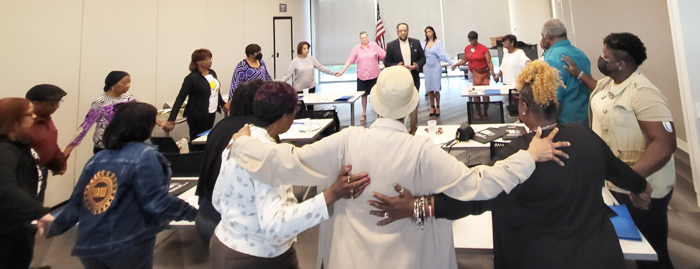
By Angie Hayes
The Truth Reporter
A “Grief and Loss Workshop,” a supportive and information event hosted by L.E.A.D. Community Church and the Interdenominational Ministerial Alliance, was held on Thursday, May 11 at the Mott Branch Library, in order to offer support to mothers impacted by gun violence.
The event began with a brief introduction and a dinner for all attendees. The beginning was an opportunity to realize the support and concern the Lead Community Church and IMA Civic Team has to address and resolve the experience of grief and loss related to gun violence.
“To support the Mental Health aspect and emotions. That’s why we are here today,” said Reverend Will Henderson.
Several participants during personal introductions, offered the following details in reference to personal experiences:
“We have to mourn each loss and it’s difficult. Birthdays, anniversaries, holidays, all are difficult. Grief and shame take over emotions,” said one attendee.
“Forgiveness is keys for health, spirituality and mental health,” noted another.
“I lost my son to gun violence in 2019,” offered yet another. “And have had multiple losses. It has been a lot of grief for me. What has got me through the grief is prayer. I pray a lot. Sitting in the waiting room for two hours after my son was shot, I said ‘Ok God this is all up to you, I know no doctor nurse or nobody, but YOU can save him. If he doesn’t survive, give me strength God to deal with it.’ My son did not survive. The next morning, I woke up and said my prayer. And I felt the calmness, my prayer (God) made peace and it made me feel good. I chose forgiveness for the situation; it was better for me to forgive instead of holding onto the pain!”
The recollections and impact on the families’ lives continued:
“Losing my mother is what caused my pain but also turned into my motivation.”
“My son passed away and I have been dealing with grief ever since.”
“I am a trauma and grief specialist and I wear many hats; helping kids 4-14 to deal with grief. I love working in the community and working to help babies. Grief has to be addressed.”
“My son was murdered in 2021.”
Reverend Will Henderson and Reverend Le Roy Williams explained the plans for the workshop and provided individual assessment forms to acquire personal knowledge of the presence of spirituality in daily living. Upon the completion of the assessment, the results placed spirituality focus into the following guidelines to offer the knowledge and opportunity for each individual to recognize, grow or establish more spirituality in daily living if needed:
- Those who enjoy all the benefits of a spiritual rich life;
- Those who emphasize spiritual values;
- Those whose spiritual concerns are part of their lives;
- Those whose spiritual lives are undeveloped
The spiritual assessment created significant personal knowledge, for each individual to acknowledge strength, or areas to address to grow in strength and spirituality. Upon completion of the assessment, the leaders moved forward to begin each session scheduled to support healing and growth.
Session one’s goal was to define “The Meaning of Grief.” Grief is one of the most difficult experiences a person can go through. To address grief, seek therapy and also turn to friends and family for support to deal with grief. Resolving grief is an important process and requires an active continual process.
There are numerous types of grief, it was explained, such as normal grief, anticipatory grief (anticipating a loss), disenfranchised grief (not believable), chronic grief, abbreviated grief, traumatic grief (such as a loss to gun violence).
Session two dealt with grief support; session three with the time and methods of dealing with grief and session three with the ways forward in order to start the process to self-healing.
The organizers and attendees noted that mental health is a matter of psychological, emotional and social well-being. Those in need were directed to the services provided by Harbor Behavioral Health, Zepf Center or Unison.
“Everyone deserves to get help,” said Bernadette Graham. “Your average person doesn’t know or care about mental health. Without our mental health, we can’t function we can’t think, love or do anything.”
The final step of the Grief and Loss Workshop was Reverend Henderson and Reverend Williams summary and review of information and resources available.
The wrap up and end of the event was finalized by the Closing Prayer: motivational support given to God and made aware to all attendees.

